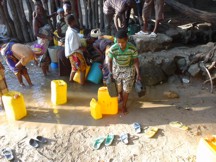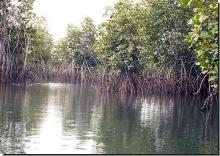Keynote Address by Rt. Rev. Dr. Nyansako-Ni Nku, AACC President, on Climate Change and Water Consultation
13 June 2008, :
 |
 |
 |
Damage caused in Mozambique due to flooding in 2000. |
In early June 2008 The Rt. Rev. Dr. Nyansako-Ni Nku gave a keynote address on climate change and water consultation at the AACC Archbishop Desmond Tutu Ecumenical Center, Nairobi, Kenya. His speech follows below:
"Today, it is widely agreed by the scientific community that climate change is a reality. The UN Intergovernmental Panel on Climate Change (IPCC) has concluded that human activities are altering our climate system and will continue to do so, and climate change will increase frequency and magnitude of extreme weather events such as droughts, floods, and storms as we are already experiencing.
 |
 |
 |
Water collection in an African village. |
The effects of a surge in hurricanes, floods, higher temperatures and water shortages are expected to fall disproportionately on the poor because they are less able to adapt. Farming in tropical and sub-tropical regions is worst hit. Africa, with its already severe economic and social problems will be most vulnerable. Disease levels will shoot up, especially in crowded cities along the continent’s coasts, which will also face inundation as sea levels rise.
Widespread poverty limits adaptation capabilities in Africa, where repeated drought, inappropriate land-use and a dependence on rain-fed agriculture increase vulnerability to climate changes. An estimated 20 million people, many of them in sub-Saharan Africa, have already been displaced by problems linked to a damaged environment, ranging from eroded farmland to polluted water supplies hence the new phenomenon of Environmental refugees in the continent. A United Nations think-tank has predicted as many as 50 million environmental refugees most of whom would be from Africa could be driven from their homes by 2010 through increased desertification, drought, flooding, storms and rising sea levels associated with global warming.
1. Effect of climate change on humans
(a) Agricultural SectorMost of Africa relies on rain-fed agriculture. As a result, it is highly vulnerable to changes in climate variability, seasonal shifts, and precipitation patterns. Any amount of warming will result in increased water stress. Roughly 70% of the population lives by farming, and 40% of all exports are agricultural products. One third of the income in Africa is generated by agriculture and livestock husbandry. Climate change will affect agricultural yield directly and indirectly through changes in soil quality, pests and plant diseases. In particular, the yield of cereals is expected to decline in Africa. As the temperature rises, conditions will be more favourable for pests like grasshoppers to complete a number of their reproduction cycle and increase their population.
(b) Health Climate change has critical health implications. Changes in rainfall will affect the presence and absence of vector – and water – borne pathogens. For example, it can be expected that small changes in temperature and precipitation will boost the population of disease – carrying mosquitoes and result in malaria epidemics. Increased flooding could facilitate the breeding of these malaria carriers in formerly arid areas. These problems will be exacerbated by the inability of many communities to cope with increased disease. In many African urban settlements, population expansion has outpaced the capacity of municipal authorities to provide civic works for sanitation and other health delivery services. If settlement conglomeration such as those envisaged for West Africa and the eastern seaboard of South Africa develop, vulnerable populations will cover entire regions, not just isolated areas.
(c) Migration Semi-arid areas of the Sahel, and the Kalahari historically have supported nomadic societies that migrate in response to annual and seasonal rainfall varieties. Nomadic pastorals systems are intrinsically able to adapt to fluctuating and extreme climates -provided they have sufficient scope for movement and other necessary elements in the system remain in place. However, the prolonged drying trend in the Sahel since the 1970s has demonstrated the vulnerability of such groups to climate change: they cannot simply move to the axis of migration when the wetter end already is occupied and permanent water points fail at the drier end. The result has been widespread loss of human life and livestock, and substantial changes to the social system.
(d) Employment Trade Unionist believe that the level of knowledge about the impact of climate change on global employment and the measures to limit its impact, are often overlooked by decision-makers. The little research that has been done on the impact of climate change on employment shows that the issue is twofold.
 |
 |
 |
Mangrove Swamp in The Gambia, Africa. |
On the short-term, closing down the industries that contribute to global warming will create unemployment, however sure to be created in other sectors that will start producing alternatives. When it comes to the effect of global warming, this is already documented to have a negative effect on employment, both on an African and a global scale. According to the 1997 report “The Regional Impact of Climate Change: An Assessment of Vulnerability” edited by Robert T. Watson, Marufu C. Zinyowera and Richard H. Moss, the social and labor consequences of a global warming will be significant in Africa. “Reduced stream flows would cause reductions in hydropower production, leading to negative effect on industrial productivity and costly relocation of some industrial plants. Management of pollution, sanitation, waste disposal, water supply and public health, as well as provision of adequate infrastructure in urban areas, could become more difficult and costly under changed climate conditions”, the report concludes.
In fact it has been reported in Kenyan daily papers that if the trend of global warming continues unchecked, most rivers in East Africa which flows from the mountains such as Kilimanjaro, Kenya, Ruwenzori etc. will dry up by 2010.
A recent publication by Don Hinrichen (Published by the World Watch Institute) also shows that the societal consequences of a1-metre rise of the oceans will be tremendous in Africa. Whole cities, the economic and labor centers, could disappear. Banjul, the Gambian capital, lies in the mangroves, and the entire city is no more than a meter above the sea level. Close to 4 million people would be displaced and part of the Nigeria economic capital of Lagos would be under water. Alexandra, Egypt second city would be lost. “The demise of this ancient city would cost the country over $32 billion in lost land, infrastructure, and tourist revenue.” The study further shows how certain labor intensive African sectors would suffer. Oil production in the Niger Delta would be lost to the advancing sea and another 10000 hectares of productive crop land would be subject to erosion and Stalinization. Some 8-10 million people would be displaced in Egypt– and the working place will lie less than one meter of sea-level.
2. Call for responsible global leadership in response to Climate ChangeSince the United Nations Conference on Environment (UNCED) in Rio de Janeiro, Brazil in 1992, there has been much debate and many international deliberations on the global environment crisis. The Kyoto Protocol, one of the outcomes of these deliberations, has been signed and ratified by most nations. The current environmental crisis cannot be overcome though voluntary actions, but through a legally binding commitment of all nations. The Kyoto Protocol was designed to ensure that all annex 1 (industrialized) countries would commit themselves to legally binding emission reductions to 1990 levels. Since then, noneof these countries have met this target, but have instead continued to increase their emissions, with the disastrous consequenceswhich are now being experienced, particularly in Africa.
The AACC therefore calls upon all the industrialized countries to implement all provisions of the Kyoto Protocol as an initial step, and that after its expiry in 2012, that this is followed by new and higher commitments based on historic responsibility and development equity. The AACC calls for global responsible leadership – both in the North and in the South, in the support for a real and actual reduction of greenhouse gas emissions, while at the same time preserving the right of all people to reach a dignified level of sustainable development. Governments of the industrialized nations must keep the promise that they made in the UN Framework Convention on Climate Change (UNFCCC) to reduce their greenhouse gas emissions.
It is my belief that this Consultation will come up with practical measures which will arrest the trend of the global warming. Every human being and every nation has responsibility to undertake to make this a better place.
Thank you and God bless you".
Links
Link here
for the AACC Leaders' Statement on Climate Change and Water Consultation
Link
here for the All African Council of Churches' website.
Link here for more Christian news stories.
Link here for more details about eco-twinning.
Link here to download the eco-twinning leaflet. (1,895 KB)
And link here for details of ARC's eco-coffins project in South Africa.
|

